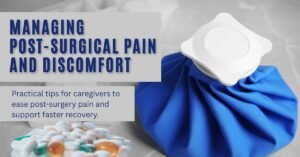After any surgical procedure, pain is a natural part of the healing process. However, if not managed properly, it can delay recovery and cause unnecessary distress. For caregivers, understanding post-surgery pain, and learning how to relieve it safely is essential. This guide offers practical advice on how to alleviate discomfort and facilitate recovery at home.
Understanding Post-Surgery Pain
Post-surgery pain occurs as the body heals from tissue damage caused during the operation.
There are different types of pain a patient may experience:
- Incisional pain – around the surgical cut or wound.
- Muscle pain – from positioning during surgery or reduced mobility afterward.
- Nerve pain – a sharp or burning sensation due to nerve irritation.
It’s normal for pain to last several days or even weeks, depending on the procedure.
However, severe, worsening, or spreading pain can signal complications, such as infection or poor wound healing—contact your healthcare provider if this happens.
Effective Pain Management Techniques
Managing post-surgery pain requires a balanced approach. The goal is not to eliminate pain but to make it tolerable enough for rest and gentle activity.
1. Medication Management
Always follow the doctor’s prescribed plan. Administer pain medications on schedule instead of waiting for pain to become severe.
Learn more about safe medication handling in our detailed guide on Medication Management.
2. Cold and Heat Therapy
- Use cold packs to reduce swelling and numb pain during the first 24 to 48 hours.
- Once approved by the doctor, warm compresses may help relax muscles and improve blood flow.
3. Positioning and Movement
Support the surgical area with pillows while sitting or lying down. Encourage gentle movement or short walks as advised — this helps prevent stiffness and improves circulation.
4. Relaxation and Breathing Techniques
Slow breathing, guided imagery, or soft background music can help distract the patient from pain. Mind-body relaxation reduces tension and supports recovery.
Non-Medical Comfort Measures
Besides medication, comfort measures play a significant role in reducing post-surgical discomfort:
- Create a restful environment with minimal noise and comfortable bedding.
- Offer gentle massages around, not directly on, the surgical area (only if approved).
- Encourage emotional support — listening, reassurance, and presence can ease anxiety-related pain.
Monitoring and Communication
Caregivers should keep a pain diary noting:
- Time and intensity of pain
- Medications given
- Activities that worsen or relieve discomfort
This helps healthcare providers adjust treatment if necessary. Always report new symptoms such as fever, swelling, or redness around the incision.
When to Seek Medical Help
Call the healthcare provider if:
- Pain suddenly increases despite medication
- There is redness, warmth, or drainage from the wound
- The patient has a fever above 100.4°F (38°C)
- Numbness or tingling develops near the surgical site
- Over-the-counter medication doesn’t bring relief
Caregiver Tips for Better Pain Control
- Stay consistent: Give medications on time and avoid skipping doses.
- Avoid over-medication: Never exceed prescribed amounts.
- Encourage small movements: Gentle activity promotes healing.
- Keep supplies ready: Cold packs, cushions, and medication schedules.
- Support rest: Ensure uninterrupted sleep and comfort.
For more practical advice on creating a healing environment, please refer to our guide, How to Prepare a Home for Patient Care.
Conclusion
Managing post-surgery pain effectively helps patients recover more quickly, regain mobility, and enhance their overall comfort. With the right balance of medication, gentle care, and emotional support, caregivers can make recovery safer and less stressful for their loved ones.
Explore our detailed post on Post-Surgical Care at Home: A Step-by-Step Guide for more recovery tips.
FAQs About Post-Surgery Pain
It depends on the type of surgery being performed. Most patients experience improvement within one to two weeks, but some procedures may require longer recovery times.
Yes, pain can often feel stronger at night due to reduced distractions and decreased movement. Giving medication before bedtime can help.
Only after the first 48 hours, and with the doctor’s approval. Early use of heat can increase swelling.
Protein-rich foods, fruits, and vegetables high in Vitamin C and zinc can support tissue repair and reduce inflammation.
If pain worsens suddenly, doesn’t respond to medication, or is accompanied by fever or swelling, call the doctor right away.





